| Country: | United Kingdom |
| Period: | XIX century, XX age |
Biography
Sir John Blackwood McEwen (13 April 1868[1] – 14 June 1948[1]) was a Scottish classical composer and educator.
John Blackwood McEwen was born in Hawick in 1868. After initial training in Glasgow, he studied with Ebenezer Prout, Corder and Tobias Matthay at the Royal Academy of Music in London.[1] After returning to Scotland, where he was a choirmaster and teacher at Greenock and Glasgow, he was invited to become Professor of Harmony and Composition at the RAM, from 1898 until 1924, and was Principal between 1924 and 1936.
With Frederick Corder and Tobias Matthay, McEwen co-founded the Society of British Composers in 1905,[1] and also served as president of Incorporated Society of Musicians.
He was knighted in 1931[2] and died in 1948 in London, aged 80.
He was married at the time of his death to Catharine, and survived by children John (composer) and Annabel, grandchildren John (author), Jacques Hetu (composer), Sofia Ruiz (violin), Joseph (composer) and Alastair McEwen. Great grandchildren of some notoriety include Stephane Tetrault of Montreal (cello) and Emju McEwen of London (violin).[3]
The National Probate Calendar has John married to Hedwig Ethel née Cole.
He is best known for orchestral works on his native Galloway, such as A Solway Symphony (1909), Hills o' Heather and Where the Wild Thyme Blows (1918). His Three Border Ballads include "Grey Galloway" (1908), "The Demon Lover" (1906–1907) and "Coronach" (1906). Other works include Hymn on the Morning of Christ's Nativity, a setting of The Hymn from Milton's Ode of the same title. He wrote a Viola Concerto in 1901 at the request of Lionel Tertis, and nineteen string quartets (only seventeen are numbered), written over a fifty-year period (1893–1947).
He invented the term "inflected speech" and introduced it in his 14 Poems for inflected voice and piano after Margaret Forbes in 1943. This is equivalent to the sprechgesang of Arnold Schoenberg.[1]
His main influences appear to be Scottish folk music, Jean Sibelius and Richard Wagner, for example, in the third movement of A Solway Symphony which shows a very strong influence from Siegfried's Rhine Journey. Most of his music is not so derivative. He seems to have been a sort of predecessor of the Scottish Renaissance in trying to use Scottish folk culture, but in a non-sentimental manner.
However, he wrote many pieces of music that were left unplayed and neglected and to this day lie in archives. Grove's Dictionary (1954) referred to him as "perhaps the most grievously neglected British composer of his generation". But he contributed to this state of affairs because he was never particularly concerned about bringing his work to the attention of the public.[1]
Thanks to a couple of recordings of his works in the early 1990s, often performed by Moray Welsh, he has become known to a new generation of listeners. More recently, the Chilingirian Quartet has recorded ten of the string quartets. Also in the 1990s helping popularise his works were his grandson Joseph (a composer and pianist) and his young great-granddaughter (a prodigy on violin) Emju, playing many of his less-known pieces as part of their orchestral and quartet tours throughout Europe and North America. Several late string trios remain unrecorded.







